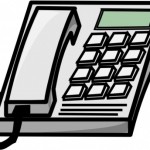A voicemail from a debt collector is not the message many people want to share with their roommate, employer, children or parents. The May/June issue of this newsletter examined the rules for debt collectors leaving messages, particularly on shared voicemail machines. Since then, several new federal court decisions have found FDCPA violations for leaving messages on voicemail.
In Branco v. Credit Collection Services Inc., the debt collector left the following message on the consumer’s parents’ answering machine five times:
“This is for Travis Branco. If the intended party cannot be reached at this number, please call 800-998-5000, and we will cease further attempts to this number. If you are not the intended party, please hang up at this time. This message contains private information and should not be played in a manor where it can be heard by others. …(music)… This call is from CCS, Credit Collection Services. This is an attempt to collect a debt and any information obtained will be used for that purpose. For your privacy protection, please visit our secure website at www.warningnotice.com to access your personal account information. Your file number is 05036201574.”
The outgoing message on the parents’ answering machine stated: “You have reached the Branco residence. Please leave a message and phone number so that Steve, Sari, or Travis may return your call.” The answering machine did not have a function permitting the listener to skip the message. His mother heard the message and conveyed the information to the consumer, who was not living with his parents at the time.
Despite the collector’s claim to the contrary, the court found that the consumer’s mother need not refrain from listening to a voice message in her own home merely because the message is for another person. The court found convincing precedent in Berg v. Merchants Ass’n Collection Division, Inc. dealing with essentially the same facts. The court held the debt collector was strictly liable under §1692c(b) for communicating with a third party, the consumer’s mother, without the consumer’s consent, whether or not the communication was deliberate, citing Zorman v. J.C. Christensen & Associates.
Smith v. Greystone Alliance L.L.C. finds a §1692e(11) violation when telephone calls did not disclose the person calling was a debt collector. The court rejected the collector’s argument that an initial §1692e(11) disclosure in a letter was sufficient to satisfy §1692e(11) in subsequent communications when the collector never raised whether the context of the subsequent contacts sufficiently disclosed that the caller was a debt collector and meaningfully identified the called as required by §1692d(6).
 Beyond the ruling, the facts in the case are particularly instructive. The collector mailed a letter that indentified defendant Greystone Alliance L.L.C. as a “debt collector” and stated that the letter was an attempt to collect a debt and that any information she provided would be used for that purpose, satisfying the first prong on §1692e(11). Just the day after mailing the letter, a Greystone employee left a voice message on Smith’s residential phone, identifying himself by his own name and informing Smith that he represented Greystone Alliance L.L.C., but not informing Smith that Greystone was a debt collector as required by the second prong on §1692e(11). He simply stated his name, his employer’s name, provided a phone number, and asked her to return his call “in regards to a file that has been placed in [his] office.” This strategy violating §1692e(11) may have been designed to avoid violating §1692c(b) by disclosing the debt to a third person.
Beyond the ruling, the facts in the case are particularly instructive. The collector mailed a letter that indentified defendant Greystone Alliance L.L.C. as a “debt collector” and stated that the letter was an attempt to collect a debt and that any information she provided would be used for that purpose, satisfying the first prong on §1692e(11). Just the day after mailing the letter, a Greystone employee left a voice message on Smith’s residential phone, identifying himself by his own name and informing Smith that he represented Greystone Alliance L.L.C., but not informing Smith that Greystone was a debt collector as required by the second prong on §1692e(11). He simply stated his name, his employer’s name, provided a phone number, and asked her to return his call “in regards to a file that has been placed in [his] office.” This strategy violating §1692e(11) may have been designed to avoid violating §1692c(b) by disclosing the debt to a third person.
The same collector then left a message with the consumer’s business partner who returned his call. The collector informed the business partner that the call related to a personal matter and the partner responded that Smith could not be reached at that number. The collected retorted that the partner should “know who [she is] doing business with.” The collector added the number to Greystone’s records instead of noting that the number was not a number at which to contact Smith.
Greystone continued to call Smith over the next several weeks. When it called, Greystone sometimes left no message, and sometimes has its employees leave a live voice message. Only the automated message indentified Greystone as a debt collector.
Greystone required its employees to use a standard script when contacting the debtor until it had been established that the collector had reached the right person on the telephone. At that point, the collector should only indentify the employee’s name, the toll-free phone number, and file number. The policy clearly directed employees not to mention the called was calling on behalf of Greystone or that they were a debt collector. While the collectors in this case disregarded the policy and continued to identify their employer, they did follow company policy and ignored the second prong of §1692e(11) requiring a statement that they are a collector.
Pages
April 2024 M T W T F S S 1 2 3 4 5 6 7 8 9 10 11 12 13 14 15 16 17 18 19 20 21 22 23 24 25 26 27 28 29 30 Categories
Archives
Blogroll

